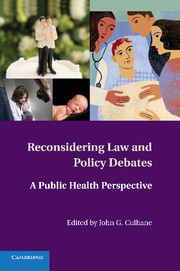Book contents
- Frontmatter
- Contents
- Contributors
- Introduction
- Part I Birth and Death
- 1 Beyond Privacy: A Population Approach to Reproductive Rights
- 2 Stretching the Boundaries of Public Health: Should We Consider End-of-Life Care a Public Health Issue?
- Part II The Limits of Civil Rights
- Part III Dimensions of Violence
- Part IV Beyond Compensation: Public Features of Private Litigation
- Index
- References
1 - Beyond Privacy: A Population Approach to Reproductive Rights
Published online by Cambridge University Press: 06 December 2010
- Frontmatter
- Contents
- Contributors
- Introduction
- Part I Birth and Death
- 1 Beyond Privacy: A Population Approach to Reproductive Rights
- 2 Stretching the Boundaries of Public Health: Should We Consider End-of-Life Care a Public Health Issue?
- Part II The Limits of Civil Rights
- Part III Dimensions of Violence
- Part IV Beyond Compensation: Public Features of Private Litigation
- Index
- References
Summary
For at least forty years, Americans have debated whether women should have a legal right to safe abortions and effective contraception. This unusually contentious battle over “reproductive rights” has been waged in numerous arenas with arguments that reflect diverse worldviews as well as distinct disciplines, including theology, medicine, constitutional theory, sociology, and political theory. Among the arguments and perspectives that have at times been employed are those that purport to be based on public health. In recent years, such public health arguments have gained new prominence, especially among opponents of reproductive rights and the Supreme Court. This chapter considers the impact of this development on reproductive rights. I begin by exploring how each side in the reproductive rights debate has employed public health arguments and the impact of those arguments on the courts' recognition of reproductive rights. I conclude by contrasting the current use of public health arguments in the ongoing debate about reproductive rights to a fuller embrace of a public health perspective and ask what such an approach might bring to the table.
Public health focuses on the health of one or more populations. In the debate over reproductive rights, the population that has generally been at issue is the population of women, especially women of childbearing age. Do reproductive rights advance or endanger their health? And in either case, what is the impact of that essentially empirical question on how we think about reproductive rights?
- Type
- Chapter
- Information
- Reconsidering Law and Policy DebatesA Public Health Perspective, pp. 15 - 39Publisher: Cambridge University PressPrint publication year: 2010



